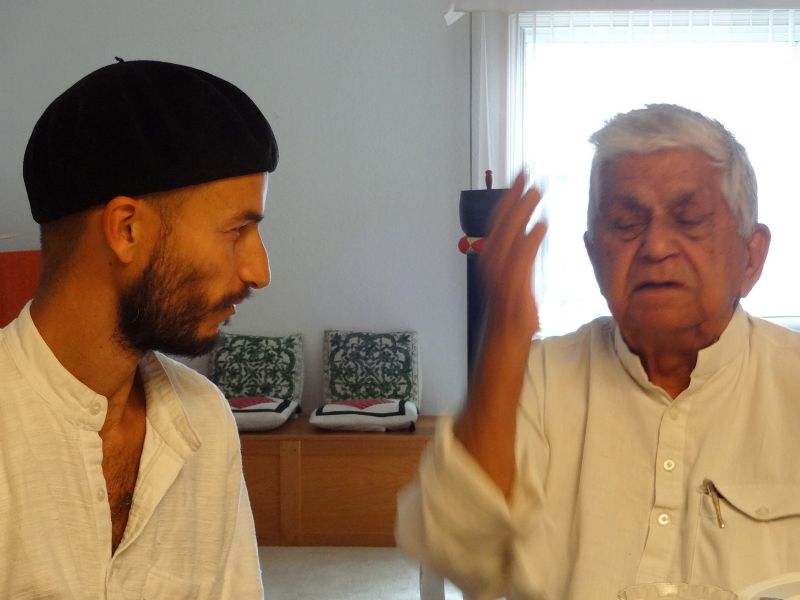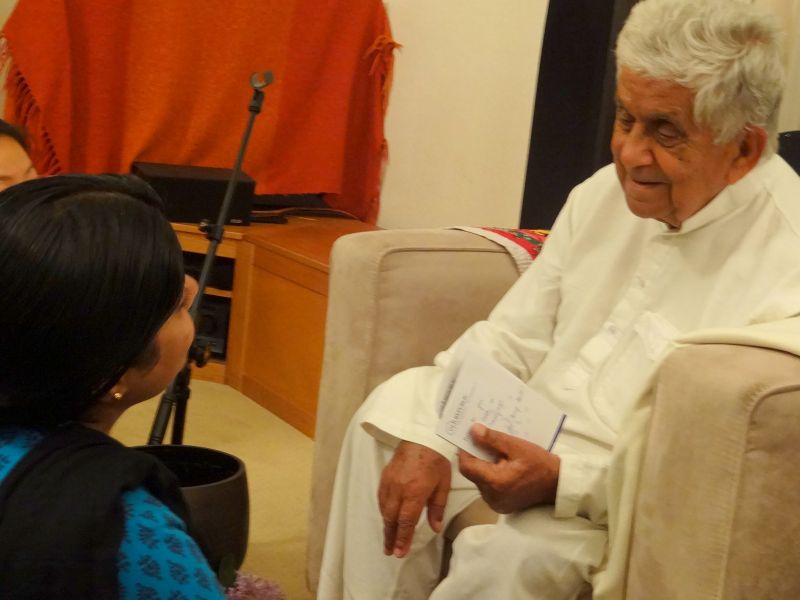Lessons From Dwarkoji
In reflecting on last week’s encounter with Dwarko Sundarani, I find myself filled with a sense of optimism. It’s a pretty powerful thing, to be in the presence of someone who has given so much of his life to service, and who so literally walks his talk.
In his early twenties, he decided to give his life to service. In his mid-forties, he met Gandhi, then Vinoba Bhave, and became a close student of Vinoba. Today, in his nineties, Dwarkoji is a gentle, strong-spoken elder.
There were so many pearls that he shared. Over the past week, a few particular insights continue to echo in my mind.
“There is an Arrangement”
He’s founded a network of schools for those with less than nothing, started an ashram on barren land, conducts tens of thousands of eye surgeries a year, and still makes time to wake up, pray, meditate, and connect with people with an enormous degree of depth and love.
What struck me the most about him, though, wasn’t what he’s done, but the way he described how it all happened.
“There is an arrangement in life,” he tells us, echoing words of Vinoba. “I don’t have so much strength. But there is some unseen force that is doing this. Fifty-seven years, I’ve never had money problems. I’m not doing anything. I’m not asking for money, and I’m not a learned man—I’m not a big leader.”
Through some “arrangement,” this penniless non-leader spends 35 miillion rupees on eye operations each year, has established 13 new villages, and distributed 5,000 acres of land among 3,000 families.
In this arrangement, Dwarkoji met Vinoba through a friend who was teaching languages to him every Saturday. One day, he tagged along, and describes:
From that first encounter, Vinoba instructed Dwarkoji to mail him a letter once a month. As their relationship grew, Vinoba received an offering of land in Bodhgaya and invited Dwarkoji to begin an ashram there. How? He must go there on foot, with no money.
Upon arriving at the closest train station, Dwarkoji had six rupees left in his pocket. He went to a rickshaw driver and asked for directions to Bodhgaya. The rickshaw driver offered to take him there for half a rupee.
“I thought—because I didn’t know Bodhgaya—I’d give him half a rupee and go with him. The remaining five and a half rupees I’d distribute among the poor people. “
But on second thought, he remembered Vinoba’s words, and opted to go on foot.
Giving his remaining six rupees to beggars at the station, Dwarkoji walked 10 kilometers with nothing in his pockets. Upon arriving at site of the future ashram, he discovered that the land was completely barren. Nothing had grown there for thousands of years.
But that didn’t phase him.
“If people give you money, you give service to people. If people don’t give you money, you work on the ashram land,” Vinoba had told him.
No one gave money.
So, for the next eight years of his life, he worked the land. Eight hours a day Dwarkoji spent in hard, physical labor, tilling and sowing the soil. One hour a day, he cooked his meal. Slowly, people came. Slowly, people gave—their hearts, time, resources, and selves.
Now, money just moves through him.
For 57 years, he’s worked and lived on that ashram without a dime to his name. All he does is for the benefit of others, and all he wishes is to share it. Towards the end of his talk, he spontaneously invited us all to join him:
“You can come, starting from tomorrow,” he says with a smile. “I’ve done the preparation work for you.”
Then he adds, “57 years is not a long time to do preparations.”
Do First, Talk After
“Gandhi was a man of doing first, talking afterwards,” Dwarkoji recalls. “All over the country, all over the world—we speak of big things—ideas about God, about spirituality, but we don’t do it… The whole world today is in need of creating a new consciousness: a super-consciousness.”

To work towards this, Dwarkoji pointed out, we write books, give lectures, and start organizations. But we get so focused on the result that we forget how each moment makes a difference. How our presence in each moment can give rise to this new consciousness. He reminds us:
We say, “We should do meditation.”
But Krishnamurti said, “We should not do meditation, meditation should happen.”
At the end of the Sunday evening, someone asked CF Mom about cooking for Wednesday. She responded, “I’m not there yet. It’s moment to moment.”
The Mother Century
Dwarkoji talked with us well into the evening. Staying up far past his bedtime to receive all our questions and offer his answers.
At 92, he is hard of hearing, so takes questions by way of pen and paper. I felt moved to connect with him, and wrote the message: This evening has given me faith.
He remarked, “This is good. When you give out faith, it comes back to you.” Then, he leaned closer and said, “The 21st Century will be the Mother Century. We must work for that."
Thinking Small
“I am not an educated person. I am just working in the field. I’ve got no money. I’m no lecturer or big orator. I’m nothing,” he told us.
Yet in being nothing, Dwarkoji is everything. A farmer, a pilgrim. A student, teacher, mentor, brother, and grandfather to all.
As he shared with us, there was an effortlessness to him. A grounded lightness that makes your heart bloom with possibility.
Posted by Audrey Lin on Oct 22, 2012
SHARE YOUR REFLECTION
6 Past Reflections


On Oct 22, 2012 Sheetal wrote:


On Oct 24, 2012 LiveWell wrote:

On Oct 25, 2012 Lavanya wrote:




On Oct 22, 2012 Pavi wrote:
Post Your Reply